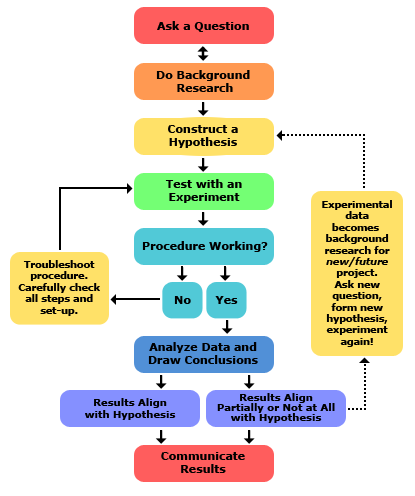"Believe me, because I said so," this is not how science works.
Scientific Method
Steps of the Scientific Method
Add Favorite Print Email Share Menu More Menu
Made possible with support from:
 What is the Scientific Method?
What is the Scientific Method?
The scientific method is a process for experimentation that is used to explore observations and answer questions.
Do
all scientists follow the scientific method
exactly? No. Some areas of science can be more easily tested than others. For example, scientists studying how stars change as they age or how dinosaurs digested their food cannot fast-forward a star's life by a million years or run medical exams on feeding dinosaurs to test their hypotheses. When direct experimentation is not possible, scientists modify the scientific method. But even when modified, the goal (and many of the steps) remains the same: to discover cause and effect relationships by asking questions, carefully gathering and examining the evidence, and seeing if all the available information can be combined into a logical answer. New information or thinking might also cause a scientist to back up and repeat steps at any point during the process. Understanding the steps of the scientific method will help you focus your scientific question and work through your observations and data to answer the question as well as possible.

The interactive diagram below may help you understand the scientific method and how it is applied to an experiment. You can click on parts of the diagram to learn more. Use the "return to top" button
to return to the diagram for more exploration.
Image Credit:
created by Amy Cowen for Science Buddies / Science Buddies
Steps of the Scientific Method
1. Ask a Question
The scientific method starts when you ask a question about something that you observe: How, What, When, Who, Which, Why, or Where?
For a science fair project some teachers require that the question be something you can measure, preferably with a number.
For detailed help with this step, use these resources:
2. Do Background Research
Rather than starting from scratch in putting together a plan for answering your question, you want to be a savvy scientist using library and Internet research to help you find the best way to do things and ensure that you don't repeat mistakes from the past.
For detailed help with this step, use these resources:
3. Construct a Hypothesis
A hypothesis is an educated guess about how things work. It is an attempt to answer your question with an explanation that can be tested. A good hypothesis allows you to then make a prediction:
"If _____
[I do this] _____, then _____
[this]_____ will happen."
State both your hypothesis and the resulting prediction you will be testing. Predictions must be easy to measure.
For detailed help with this step, use these resources:
4. Test Your Hypothesis by Doing an Experiment
Your experiment tests whether your prediction is accurate and thus your hypothesis is supported or not. It is important for your experiment to be a fair test. You conduct a fair test by making sure that you change only one factor at a time while keeping all other conditions the same.
You should also repeat your experiments several times to make sure that the first results weren't just an accident.
For detailed help with this step, use these resources:
5. Analyze Your Data and Draw a Conclusion
Once your experiment is complete, you collect your measurements and analyze them to see if they support your hypothesis or not.
Scientists often find that their predictions were not accurate and their hypothesis was not supported, and in such cases they will communicate the results of their experiment and then go back and construct a new hypothesis and prediction based on the information they learned during their experiment. This starts much of the process of the scientific method over again. Even if they find that their hypothesis was supported, they may want to test it again in a new way.
For detailed help with this step, use these resources:
6. Communicate Your Results
To complete your science fair project you will communicate your results to others in a final report and/or a display board. Professional scientists do almost exactly the same thing by publishing their final report in a scientific journal or by presenting their results on a poster or during a talk at a scientific meeting. In a science fair, judges are interested in your findings regardless of whether or not they support your original hypothesis.
For detailed help with this step, use these resources:
Click here for source of the above information.





